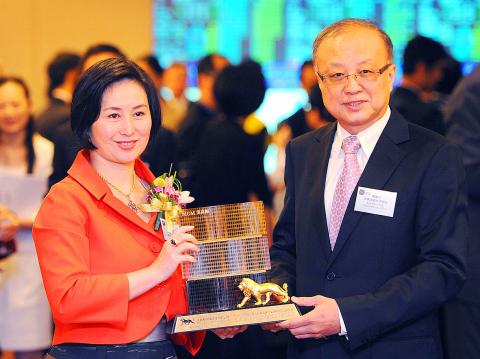Macau casino operator MGM China Holdings Ltd (美高梅中國控股) rose up to 6 percent on its Hong Kong stock exchange debut yesterday, highlighting strong investor interest in the world’s biggest gambling market.
Shares in MGM China, which is controlled by Las Vegas-based MGM Resorts International, rose to HK$16.26 (US$2.09), up HK$0.92, after trading began yesterday morning, before easing back to HK$15.84.
Meanwhile, the benchmark Hang Seng Index dipped about 0.3 percent.

Photo: AFP
The company raised HK$11.7 billion by selling 760 million shares at HK$15.34, the top end of the offer price range.
MGM China chairwoman Pansy Ho (何超瓊) said she was “satisfied” with trading.
“We all think is an encouraging indication,” Ho said after a listing ceremony at the stock exchange.
Local investors in Hong Kong applied for 20 times more shares than were available to them, prompting the company to triple its proportion of total shares sold to 30 percent.
The remaining 70 percent of the initial public offering (IPO) was also “significantly oversubscribed” by big global investors, MGM China said.
Those investors included Tracinda Corp, billionaire investor Kirk Kerkorian’s investment arm, and Paulson & Co Inc, the New York hedge fund run by John Paulson. Tracinda and Paulson are also MGM Resorts’ two biggest shareholders.
The high demand for shares in the IPO illustrates how big profits in Macau’s casino industry, the world’s top gambling market, are attracting investor interest.
Casino revenues in the former Portuguese colony, which was handed back to China in 1999, have rocketed since a four-decade gambling monopoly was broken up in 2002.
Last year, Macau raked in US$23.5 billion in gambling revenue, about four times more than the Las Vegas strip’s US$5.8 billion. Monthly revenues from February to last moth jumped at least 42 percent over the year before.
MGM’s casino is one of 34 in Macau, the only place in China where casino gambling is legal.
Following the IPO, MGM Resorts has 51 percent ownership and management control of MGM China, Ho has a 29 percent stake and other shareholders own the remaining 20 percent. Previously, it was a 50-50 joint venture between MGM Resorts and Ho.
Ho is the 48-year-old daughter of gambling tycoon Stanley Ho (何鴻燊), considered the father of modern gambling in China.

The Eurovision Song Contest has seen a surge in punter interest at the bookmakers, becoming a major betting event, experts said ahead of last night’s giant glamfest in Basel. “Eurovision has quietly become one of the biggest betting events of the year,” said Tomi Huttunen, senior manager of the Online Computer Finland (OCS) betting and casino platform. Betting sites have long been used to gauge which way voters might be leaning ahead of the world’s biggest televised live music event. However, bookmakers highlight a huge increase in engagement in recent years — and this year in particular. “We’ve already passed 2023’s total activity and

Nvidia Corp CEO Jensen Huang (黃仁勳) today announced that his company has selected "Beitou Shilin" in Taipei for its new Taiwan office, called Nvidia Constellation, putting an end to months of speculation. Industry sources have said that the tech giant has been eyeing the Beitou Shilin Science Park as the site of its new overseas headquarters, and speculated that the new headquarters would be built on two plots of land designated as "T17" and "T18," which span 3.89 hectares in the park. "I think it's time for us to reveal one of the largest products we've ever built," Huang said near the

China yesterday announced anti-dumping duties as high as 74.9 percent on imports of polyoxymethylene (POM) copolymers, a type of engineering plastic, from Taiwan, the US, the EU and Japan. The Chinese Ministry of Commerce’s findings conclude a probe launched in May last year, shortly after the US sharply increased tariffs on Chinese electric vehicles, computer chips and other imports. POM copolymers can partially replace metals such as copper and zinc, and have various applications, including in auto parts, electronics and medical equipment, the Chinese ministry has said. In January, it said initial investigations had determined that dumping was taking place, and implemented preliminary

Intel Corp yesterday reinforced its determination to strengthen its partnerships with Taiwan’s ecosystem partners including original-electronic-manufacturing (OEM) companies such as Hon Hai Precision Industry Co (鴻海精密) and chipmaker United Microelectronics Corp (UMC, 聯電). “Tonight marks a new beginning. We renew our new partnership with Taiwan ecosystem,” Intel new chief executive officer Tan Lip-bu (陳立武) said at a dinner with representatives from the company’s local partners, celebrating the 40th anniversary of the US chip giant’s presence in Taiwan. Tan took the reins at Intel six weeks ago aiming to reform the chipmaker and revive its past glory. This is the first time Tan